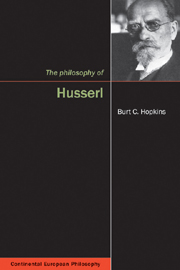Book contents
- Frontmatter
- Contents
- Acknowledgements
- Abbreviations
- Prolegomenon: Husserl's turn to history and pure phenomenology
- I Plato's and Aristotle's theory of eidē
- II From descriptive psychology to transcendentally pure phenomenology
- III From the phenomenology of transcendental consciousness to that of monadological intersubjectivity
- IV From monadological intersubjectivity to the historical a priori constitutive of all meaning
- 11 The pure phenomenological motivation of Husserl's turn to history
- 12 The essential connection between intentional history and actual history
- 13 The historicity of both the intelligibility of ideal meanings and the possibility of actual history
- 14 Desedimentation and the link between intentional history and the constitution of a historical tradition
- 15 Transcendental phenomenology as the only true explanation of objectivity and all meaningful problems in previous philosophy
- V The unwarranted historical presuppositions guiding the fundamental ontological and deconstructive criticisms of transcendental philosophy
- Epilogue: Transcendental-phenomenological criticism of the criticism of phenomenological cognition
- Coda: Phenomenological self-responsibility and the singularity of transcendental philosophy
- Notes
- Bibliography
- Index
13 - The historicity of both the intelligibility of ideal meanings and the possibility of actual history
from IV - From monadological intersubjectivity to the historical a priori constitutive of all meaning
- Frontmatter
- Contents
- Acknowledgements
- Abbreviations
- Prolegomenon: Husserl's turn to history and pure phenomenology
- I Plato's and Aristotle's theory of eidē
- II From descriptive psychology to transcendentally pure phenomenology
- III From the phenomenology of transcendental consciousness to that of monadological intersubjectivity
- IV From monadological intersubjectivity to the historical a priori constitutive of all meaning
- 11 The pure phenomenological motivation of Husserl's turn to history
- 12 The essential connection between intentional history and actual history
- 13 The historicity of both the intelligibility of ideal meanings and the possibility of actual history
- 14 Desedimentation and the link between intentional history and the constitution of a historical tradition
- 15 Transcendental phenomenology as the only true explanation of objectivity and all meaningful problems in previous philosophy
- V The unwarranted historical presuppositions guiding the fundamental ontological and deconstructive criticisms of transcendental philosophy
- Epilogue: Transcendental-phenomenological criticism of the criticism of phenomenological cognition
- Coda: Phenomenological self-responsibility and the singularity of transcendental philosophy
- Notes
- Bibliography
- Index
Summary
The historical problem underlying Husserl's concept of intentional history
In the foregoing we have indicated that for Husserl the transcendental enquiry into the problem of the intentional history of the categorial formations of the meaning making up an object's identity reveals the essential necessity of its involvement in a history in the usual sense of the term. That is, the transcendental enquiry into the intentional history of the categorial unity of an object discloses an essential connection between the origin of this unity and its historical development within natural time.
For Husserl the connection between the problem of enquiry that underlies historical reflection and intentional history is established when he – in the works that present the final phase of his thought – once again takes up a task that psychologism cannot solve on its own terms but has addressed in its own way: the investigation of the origin of the unity of the meaning formation of any intentional object. In these works Husserl showed that the enquiry into the constitution of any meaning formation as an invariant that transcends the natural time presupposed by psychologism is itself but a mode of “objective omnitemporality” (CM, 156). As such, its identity is an intentional product of the continual accomplishments of transcendental subjectivity, which bring about the combination (Verbindung) constituted through the medium of recollective representations that yields the objectivity belonging to the ideal determinations of the unity of meaning.
- Type
- Chapter
- Information
- The Philosophy of Husserl , pp. 187 - 191Publisher: Acumen PublishingPrint publication year: 2010



